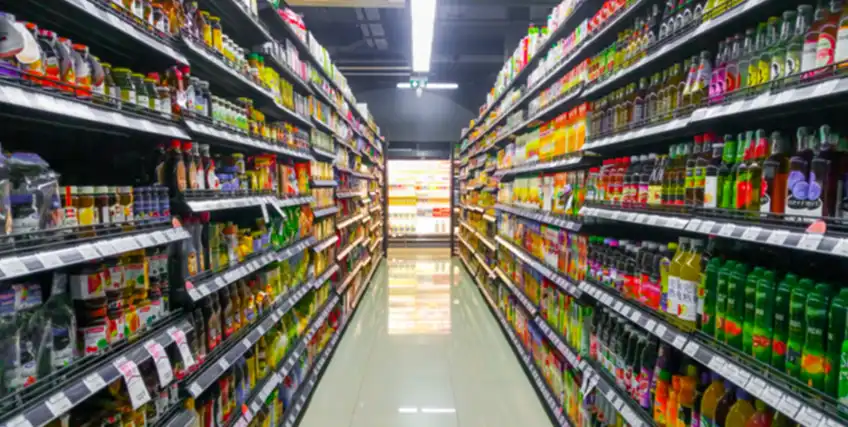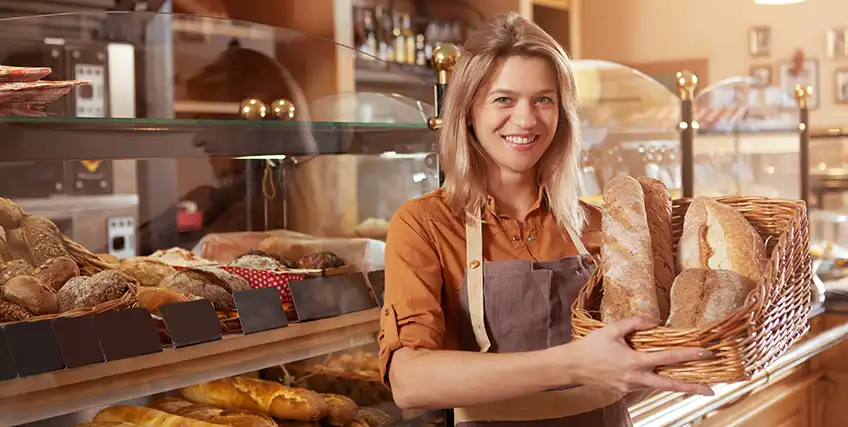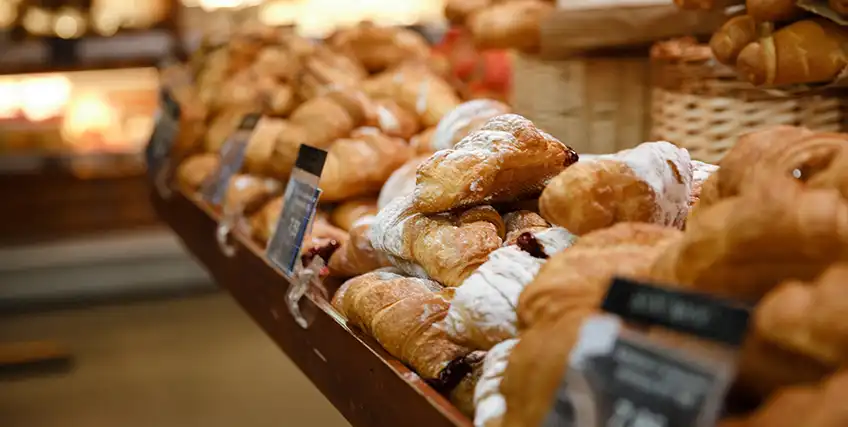Funding Your Bakery: How to Navigate the SBA Loan Process
March 31, 2025 | Last Updated on: April 02, 2025

Walking into a bakery is a visceral experience, overwhelming one’s senses from the warmth of the ovens to the sweet smell of baked goods. Whether it’s the cookie shop on the corner or a commercial bakery supplying specialty bread to a grocery store chain, the baking industry is growing in popularity worldwide. In fact, the bakery industry is expected to be a $919 billion global industry by 2032, with an expected compound annual growth rate (CAGR) of 5.9% between 2023 and 2028.
If you’re thinking about starting a bakery of your own, though, you have more to worry about than just the crumb of your latest loaves — you are also probably wondering about the best way to fund your new business. For some business owners, a loan from the Small Business Administration (SBA) can be a great place to start your funding search. While the SBA loan process can be a bit lengthier and more involved than other business loans, SBA loans often offer borrowers lower rates, higher loan limits, and better repayment terms than you’d find at banks and credit unions.
Here’s a look at what SBA loans offer to bakery owners, how much you can borrow, and what to expect from the SBA loan process.
What is an SBA Loan?
An SBA loan is a form of small business funding that’s backed by the U.S. Small Business Administration (SBA). These loans are provided by SBA-approved lenders, such as banks, credit unions, and online lenders. Since these loans are government-backed, they are considered less risky for SBA lenders, so borrowers may be able to access higher loan amounts for their business needs or even a lower interest rate on repayment.
There are a few different types of SBA loans, including SBA 7(a) loans (the most common type), 504 loans (available through Certified Development Companies or CDCs), and even some microloan programs. The right one for you depends on how much you want to borrow, what you qualify for, and even how much you have available for a down payment, if applicable.
Most SBA loans offer up to $5 million in funding with loan terms as long as 25 years. SBA 504 loans are designed for fixed asset funding, meaning you can use them to buy things like real estate or equipment. Microloans provide small business loan financing for up to $50,000, which may be a good option for expanding an existing business or tackling smaller business purposes.
Benefits of SBA Loans for Bakeries
The SBA loan process isn’t as quick as some other loans, so small business owners may want to consider other small business loans, equipment loans, or even disaster loans to fund acute financial needs. If you have some time to tackle the underwriting process, though, SBA lending can be a worthwhile financing option with many benefits.
New businesses can qualify
As mentioned, SBA loans are backed by the government, so lenders aren’t taking on as much risk. Even entrepreneurs with limited business experience or startups can often qualify, and some SBA loans are even available for nonprofits.
Depending on your business credit history, you may be asked to provide a personal financial statement as part of the SBA loan process.
Lower interest rates
SBA loans through preferred lenders will often have lower interest rates compared to traditional bank loans. The SBA even sets the maximum rates allowed under each loan type, though you may still want to shop around to find the right lender match (and best possible terms) for you. The higher your creditworthiness, the better the rate you’ll usually be offered.
Visit the Terms and Eligibility Page on SBA.gov to view current SBA loan rate caps and other loan specifications.
Longer repayment terms
Depending on how you’re using your SBA loan, you may be able to lock in a repayment term as long as 25 years. Equipment loans, for example, usually have a repayment term of 10 years while buying real estate qualifies you for a more long-term SBA loan with up to 25 years of repayment.
Funds flexibility
Once you make it through the SBA loan process and are approved for funding, you can begin planning all the great ways to use that cash. You can use small business loans for starting a business, expanding an existing business, or even acquiring someone else’s business.
SBA loans funds can be put toward any number of purposes.
- Buying, improving, or building land or other real estate
- Buying out existing partners
- Refinancing or consolidating previous business debt
- Purchasing equipment, supplies, or furniture
- Covering short- or long-term working capital needs
Different SBA loans will have different fund limitations, so it’s important to read through the website (and your SBA forms) for additional information. If you don’t understand what you can and cannot use the money toward, be sure to reach out to the SBA or your chosen lender.
Qualifications for SBA Loan for a Bakery
The SBA loan process can take multiple weeks to complete from initial application to funds disbursement. A big part of that process is underwriting, where the lender will decide whether you meet the SBA guidelines for a government-backed loan and also if you meet the lender’s own eligibility criteria.
While some SBA loans are available to non-profits, most (including the 7a loan) are only offered to for-profit businesses operating in the U.S. Businesses must fall under the category of “small,” be operational, and demonstrate creditworthiness to get approved, too. The longer your business has been operational and the more financial records you have, the better.
Your business, and often personal, credit scores will impact loan approval. If you don’t have any business history, you’ll have a tougher time making it through the SBA loan process than if you can demonstrate a history of managing loans and credit well.
As part of the SBA loan process, you’ll be asked to provide many forms of financial documentation. This could include:
- Previous tax returns
- Business balance sheets
- Cash flow statements
- Personal financial statements
If your small business doesn’t have the history and credit to qualify for an SBA loan on its own, you may be asked to either provide collateral to secure the loan or even provide a personal guarantee for the debt.
Steps to Apply for an SBA Loan for Your Bakery
Now that you understand what to expect from the SBA loan process, here’s a look at exactly how to tackle it.
1. Prepare Your Bakery’s Financial Documents
Before you ever submit your first application, be sure to gather all the documents you may need to provide or reference along the way. Each lender will have its own requirements but generally, expect to need your tax returns, financial statements, federal Employer Identification Number (EIN), and Social Security number.
One thing that’s different about the SBA loan process is that you’ll also be asked to provide a business plan. This will help potential lenders understand your goals and vision for your business, as well as how you’ll use the money.
2. Choose the Right SBA Loan Program for Your Bakery
There are a few different SBA loans to choose from, depending on your needs. Before you can find the right approved lender, spend some time researching while loan is right for you.
- SBA 7(a) loans are general purpose loans, and can be used for everything from land and building purchases to equipment, office furniture, supplies, and working capital.
- SBA 504 loans are for financing assets like equipment and real estate.
- SBA microloans are general purpose small loans (up to $50,000) for new or smaller businesses, including bakeries.
3. Find an SBA-Approved Lender
Once you have everything gathered and understand what you need (and how much you need), it’s time to shop for an SBA-approved lender. These can be banks, credit unions, and online business lenders, which you’ll find by using the SBA Lender Match tool on the SBA website.
After you have a list of potential lenders, spend some time researching them. You might find that one has experience in the bakery industry and might be a better fit for you and your business than the others.
4. Complete the SBA Loan Application
You’ll apply through lenders directly, not through the SBA. Your application will vary from one lender to the next, but will usually mean entering your personal and business information, uploading financial documents, providing a business plan, and noting how much you need to borrow.
Many lenders will let you track your application as it moves through the SBA loan process. This can take a few weeks to complete, so be patient! You may also be asked to clarify things or provide additional documentation.
5. Loan Approval and Funding
Now all you can do is wait. Your potential lender will review your application, business and personal credit history, financial situation, and business plans to see if you’re a good candidate for an SBA loan. They will weigh certain risk factors to determine not only your approval but also the loan limits, terms, and rates you’ll be offered once approved.
After you’re approved, you will sign a promissory note that explains the loan terms and your guarantee to repay the debt. Afterward, funds will be disbursed according to the lender’s process and your preferences; this step in the SBA loan process can sometimes occur the same day or may take multiple days to complete.
Final Thoughts
Government-backed small business loans can be a great funding option for small businesses like bakeries, offering the capital necessary to start or expand the company, cover cash flow needs, or even consolidate existing debt. These loans are available through approved lenders and can offer up to $5 million in small business funding, but the SBA loan process is notably longer and more complex than with some other small business lenders.
If you’re seeking growth and financial stability, a little bit of patience could go a long way. Like waiting for your loaves to rise, working your way through the somewhat-arduous SBA loan process can be frustrating but it can also be incredibly rewarding in terms of high loan limits, long repayment terms, and competitive interest rates.
FAQs about the SBA Loan Process
How can I use my bakery SBA loan?
SBA loan funds can be used to purchase an existing business, build and start a new business, expand your company, purchase equipment and supplies, cover marketing and hiring expenses, or even just cover working capital while the business gets up and running.
Can I get an SBA loan for a startup?
Yes, SBA loans are available to startups, newer businesses, and small companies. To qualify, you’ll need to demonstrate business and/or personal creditworthiness. Most SBA loan borrowers will also need to show that their company is already operational to qualify.
Do I need collateral for my SBA loan?
Some SBA loans may require collateral, especially 504 loans that are designed to purchase named assets such as equipment or real estate.
How much can my bakery borrow with an SBA loan?
SBA loans are available for as much as $5 million in small business funding. How much you can borrow depends on your business, how you plan to use the money, and your creditworthiness.
Do I need a down payment for an SBA loan?
A down payment is often required, though the exact amount will vary by lender. Generally, a 10% down payment is required on SBA loans for bakeries and other small businesses.




